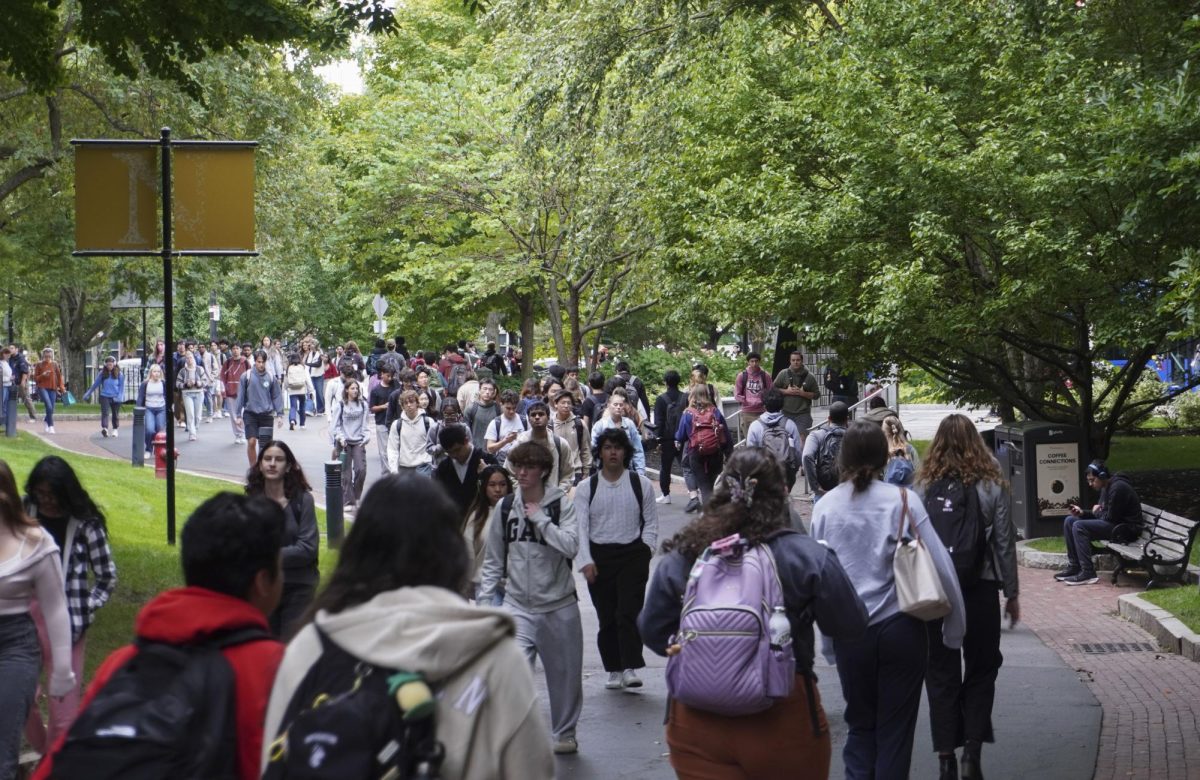Students who incorporate exercise into their daily routines are likely doing their body a favor. But like most things, in excess, exercise can cross a line, transforming from a healthy habit to a dangerous disorder.
For Northeastern students, recreational facilities like the Marino Center provide opportunities to stay fit and create workout routines. But it’s possible for some students to push themselves too far, said Emily Fox-Kales, a psychology professor.
While most people don’t get the minimal amount of suggested exercise, others may push their routines to an unhealthy limit, said Kristen Miller, director of fitness at Marino. Sometimes, Miller said, this can be chalked up to inexperience.
“If someone doesn’t have an exercise history, consulting a trainer is a great idea,” she said.
And whether this trend is fueled by a quest for a six-pack, access to skinny jeans or a desire to increase endorphins, certain dangers are always present if a student is “over-exercising,” she said.
Late last year, Boston Globe reporter Bella English, who teaches journalism courses at Boston College, began investigating the idea of “over-exercising” when a student told her the “Plex,” BC’s version of Marino, was the place to be on Friday nights.
“I hadn’t thought about it,” English said, “that people actually socialize in the gym, and spend an inordinate amount of time there.”
In her article, “Fit to a Fault on Campuses,” English exposed the students’ exercise habits as common at schools across the city in an age of finely tuned images that boast flawless skin, toned stomachs and rippling muscles as the aesthetic standard.
At BU, English reported, 5,000 people visit the fitness center on a daily basis. Here at Northeastern, about 2,800 students visit Marino every day, Miller said.
The article generated a variety of reactions and spurred dialogue regarding the subject.
Many responses English received were from university faculty and staff members, including Fox-Kales, who expressed concern about the issues revealed in the article.
“Here at Northeastern University, we have found that students reaching out to other students through our peer support and education program on campus are more effective means of preventing such ‘self-controlling’ body practices as excessive exercising and dieting from spiraling out of control,” Fox-Kales wrote in a letter to the editor that was published in The Globe Jan. 26.
Fox-Kales is also a clinical psychologist who specializes in eating disorders, and created a program on campus called the Northesatern University Eating and Weight Concerns Project (NEWCOPE) to educate students about eating disorders and body-image frustrations.
As part of her efforts, Fox-Kales and the students who work with her at NEWCOPE meet twice a week to discuss measures they can take to combat and educate students about eating disorders.
Over-exercising is an issue Fox-Kales and her students see as a potential detriment to college students, a demographic at high-risk for developing eating disorders, she said.
“What were once considered pathological behaviors are now considered ideal behaviors,” Fox-Kales said. “Very subtle ways of working out can become the quest for the ideal body [which] can result in spending your life at the gym.”
Excess amounts of exercise, to the point where working out overrides other obligations and hobbies, can qualify as an eating disorder, called exercise bulimia, she said.
Risk factors for exercise bulimia are similar to those of anorexia nervosa, and the more commonly acknowledged bulimia nervosa, which includes binging and purging, Fox-Kales said.
People who impose too much control, overvalue thinness and struggle with self-esteem may be susceptible to developing an eating disorder like exercise bulimia, which does not include purging.
Exercising before you eat, or surrounding meals with work-out routines, are key signs in detecting exercise bulimia, Fox-Kales said. A person whose goal was once getting fit could transform into someone with a frantic obsession with exercise.
“If it begins to interfere with a person’s normal functioning at home, at school, in their social life, if it gets to the point where it’s unmanageable – you always want to look for that [as signs to start to help],” Fox-Kales said.
Declaring a limit on work out duration would be a difficult task, Fox-Kales said, because determining when a person crosses the line from casual to compulsive exercise is not a black-and-white issue.
Approaching someone who may be exhibiting symptoms of exercise bulimia, or any other eating disorder, is also difficult for bystanders, she said.
“Initially, I wouldn’t make an assumption,” said Kate Porter, a middler psychology major and group manager of NEWCOPE’s Eating Disorder Awareness Week. “It makes people shut down.”
Although intervention can be complicated and daunting, Miller said one of her responsibilities as fitness center director is to keep an eye on unhealthy exercise habits that may emerge in students.
“We certainly can’t deny [Marino] access to anyone,” Miller said. “It’s a personal, private issue. … But if we see a [potential] problem, we may recommend that they consult someone at the health center.”
Fox-Kales and her students provide various outlets for those who are suffering from eating disorders, have an afflicted friend or family member or are interested in learning more about eating disorders.
As part of their initiative, NEWCOPE is hosting Eating Disorder Awareness week in conjunction with Delta Zeta and Delta Phi Epsilon from Feb. 22 to Feb. 28.
The week will feature events like “Comfortable in Your Own Jeans,” where participants will be encouraged to dispose of their “skinny jeans,” and an invitation to sign a “No Weigh Contract,” in which people pledge to feel better about their bodies.
“NEWCOPE is not a psychotherapy agent,” Fox-Kales said. “Our job is to really guide people who are ready for treatment and referrals. But if they’re not, we run into … problems. It’s very tricky.”
NEWCOPE also has a drop-in time for those seeking answers or information about eating disorders Tuesdays from 4 p.m. to 6 p.m. at 234 Curry Student Center, Fox-Kales said.










